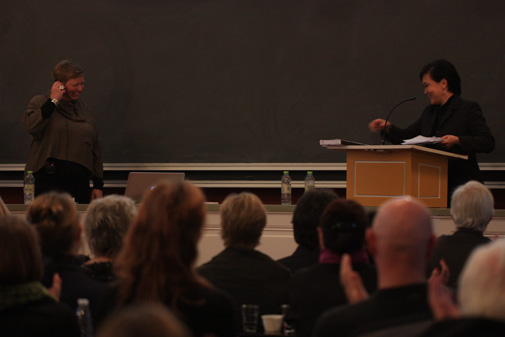Building Social Capital - a joint venture between management and employees in a Danish MNC
PhD public oral defence, Christina Colclough
On the 7th of December 2012 Christina J. Colclough from FAOS, Employment Relations Research Centre, defended her PhD Building Social Capital - a joint venture between management and employees in a Danish MNC – in a well attended auditorium in Studiegaarden in Copenhagen, where she also received her doctoral degree.

Photo: Mark Colclough
If Danish companies take the Danish company culture with them when establishing subsidiaries abroad, they can improve the company’s potential competitive strength. They often represent an informal corporate culture, that creates challenge and trust among the employees in the foreign subsidiaries, where a more hierarchical management style has been prevailing.
This was a couple of the main conclusions, which was presented during the defense, and Christina Colclough used the opportunity to elaborate on how the Danish corporate culture and management style is being exported:
- The Danish managers are not aware that they, just by acting the way that they have always done, are being perceived in a very different way in subsidiaries outside of Denmark, Christina said.
As a part of her PhD thesis she has interviewed both managers and employees at a larger Danish company’s subsidiaries in Denmark, Russia and Poland. All countries with very different traditions for cooperation and negotiation. In Denmark there is a large degree of employee involvement, in contrast to Poland and Russia that has a more hierarchical approach. In these two countries the manager actually dresses as a manager and acts like a manager. Christina mentioned at the start of her defense, that some of the employees at one point asked her, if she was a spy for the management.
The original issues for her PhD were a bit different than the final results. The turning point came, when a Polish worker in the middle of an interview said: “The way it is here (i.e. management style and company politics) is how it should be.”
After that, she changed her focus to how a Danish company had succeeded in building social capital and learning in its Danish, Polish and Russian subsidiaries.
The three opponents were Associate Professor Peter Abrahamson from the University of Copenhagen, Professor Dana Minbaeva from Copenhagen Business School and Professor Tony Huzzard form the University of Lund, Sweden.
Some of the most essential questions asked were:
- What are actually the characteristics of a Danish management style and how can it be measured?
- Which newer theoretical publications could also have been used to enlighten the issues of the Phd thesis?
- What are the implications in the selection of countries, i.e. Denmark, Russia and Poland?
There was one more question ex auditoria, which to a certain degree summoned the question that had arisen during the defence; would the Danish management style have the same amount of success, if it was another company from another sector that was transmitted to countries with a different tradition for cooperation than the Danish tradition and neither as absent as in Russia and Poland?
